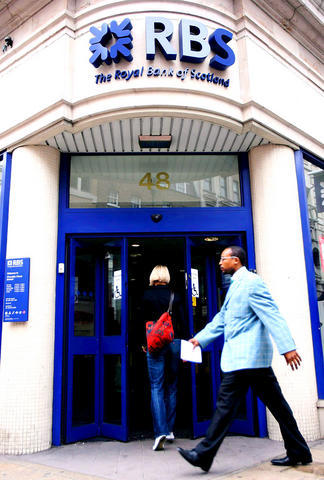European stock exchanges ended the week well into negative territory on Friday, dragged down by persistent fears for the health of the banking sector and its exposure to the US home mortgage crisis.
The London FTSE 100 index shed 1.08 percent to close at 6,291.2 while in Paris the CAC 40 lost 0.67 percent to reach 5,523.63. The Frankfurt Dax fell 0.71 percent to end the session at 7,612.26.
The Euro Stoxx 50 index of leading eurozone shares lost 0.44 percent to reach 4,282.4 by the end of trading.

PHOTO: EPA
In London real estate lender Alliance and Leicester fell 6.32 percent to ?6.07 on renewed fears for its financing. The bank is seen as particularly fragile in the current financial market turmoil because of its heavy borrowing needs.
Many banks around the world have cut back on their lending in response to the collapse of the US subprime -- or high-risk -- US morgage market. A wave of foreclosures has undermined the value of billions of dollars in securities held by banks and finance institutions that are backed by such mortgages.
Elsewhere in the financial sector, Northern Rock fell 1.55 percent to ?1.326, HBOS was down 2.4 percent at ?7.595 and Royal Bank of Scotland gave up 4.9 percent to close at ?4.365.
In Paris energy giant Total gained 1.34 percent to finish at 54.32 euros on higher crude prices, which reflected OPEC's rejection of appeals for an increase in its production.
As in London, banks in Paris weighed heavily on market sentiment. Societe Generale shed 2.6 percent to reach 102.27 euros while BNP Paribas fell 1.71 percent to 71.46 euros.
In Frankfurt chipmaker Infineon was the day's big loser, sliding 10.44 percent to 8.15 after several banks lowered their projections for the share.
Elsewhere there were declines of 1.34 percent to 8,478.8 on the Swiss Market Index, 1.32 percent to 500.08 in Amsterdam, and 1.12 percent to 4,060.71 in Brussels.
There were gains of 0.23 percent to 38,535 in Milan and 0.27 percent to 15,769 in Madrid.

BYPASSING CHINA TARIFFS: In the first five months of this year, Foxconn sent US$4.4bn of iPhones to the US from India, compared with US$3.7bn in the whole of last year Nearly all the iPhones exported by Foxconn Technology Group (富士康科技集團) from India went to the US between March and last month, customs data showed, far above last year’s average of 50 percent and a clear sign of Apple Inc’s efforts to bypass high US tariffs imposed on China. The numbers, being reported by Reuters for the first time, show that Apple has realigned its India exports to almost exclusively serve the US market, when previously the devices were more widely distributed to nations including the Netherlands and the Czech Republic. During March to last month, Foxconn, known as Hon Hai Precision Industry

Taiwan Semiconductor Manufacturing Co (TSMC, 台積電) and the University of Tokyo (UTokyo) yesterday announced the launch of the TSMC-UTokyo Lab to promote advanced semiconductor research, education and talent development. The lab is TSMC’s first laboratory collaboration with a university outside Taiwan, the company said in a statement. The lab would leverage “the extensive knowledge, experience, and creativity” of both institutions, the company said. It is located in the Asano Section of UTokyo’s Hongo, Tokyo, campus and would be managed by UTokyo faculty, guided by directors from UTokyo and TSMC, the company said. TSMC began working with UTokyo in 2019, resulting in 21 research projects,

Ashton Hall’s morning routine involves dunking his head in iced Saratoga Spring Water. For the company that sells the bottled water — Hall’s brand of choice for drinking, brushing his teeth and submerging himself — that is fantastic news. “We’re so thankful to this incredible fitness influencer called Ashton Hall,” Saratoga owner Primo Brands Corp’s CEO Robbert Rietbroek said on an earnings call after Hall’s morning routine video went viral. “He really helped put our brand on the map.” Primo Brands, which was not affiliated with Hall when he made his video, is among the increasing number of companies benefiting from influencer

Quanta Computer Inc (廣達) chairman Barry Lam (林百里) yesterday expressed a downbeat view about the prospects of humanoid robots, given high manufacturing costs and a lack of target customers. Despite rising demand and high expectations for humanoid robots, high research-and-development costs and uncertain profitability remain major concerns, Lam told reporters following the company’s annual shareholders’ meeting in Taoyuan. “Since it seems a bit unworthy to use such high-cost robots to do household chores, I believe robots designed for specific purposes would be more valuable and present a better business opportunity,” Lam said Instead of investing in humanoid robots, Quanta has opted to invest